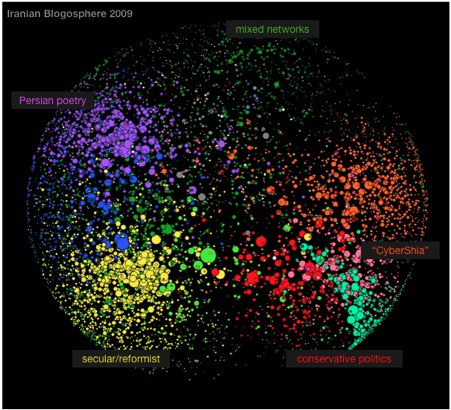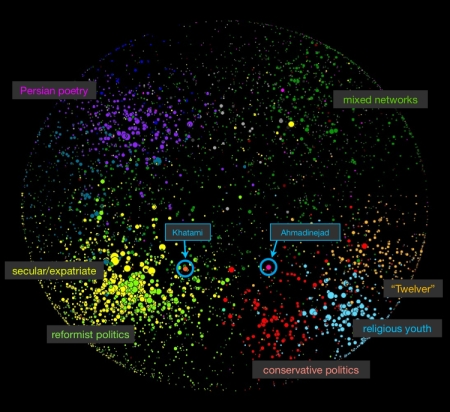Facebook Diplomacy: How Governments are Exploiting the Internet
February 26th, 2009 — Bruce EtlingOur friend Evgeny Morozov has a great new piece in Newsweek exploring how democratic governments and dictatorial regimes alike are successfully leveraging the Internet. He cites a number of examples we’ve brought to light on this blog, including Iranian Basiji bloggers and their location on our new Iranian blogosphere map, Israel-directed bloggers during the war in Gaza, and public diplomacy 2.0 in the US. He cites our own John Kelly on Iran’s efforts, writing, “John Kelly, an expert in the Iranian blogosphere at Harvard’s Berkman Center, has found that in the last year, the proportion of religious sites among the top 5,000 most-linked Iranian blogs has grown from 16 percent to 31 percent.”
The Kremlin of course is no stranger to the benefits of the Web either. While it is surprising to many that the Kremlin doesn’t block the Internet at all, Evgeny thinks this might be because they have had better luck spinning it. He writes:
The Kremlin uses a private firm, New Media Stars, founded by Konstantyn Rykov, a 29-year-old Duma deputy. Rykov’s new media empire includes online news sites, a site for supporters of Vladimir Putin (zaputina.ru—”For Putin!”), online games and an Internet TV channel with a pro-Kremlin bent. Navigating these mazes of propaganda and trying to plant effective pro-American messages would be difficult even for a Web-savvy State Department.
The article also sheds light on China’s ’50 cent party,’ or the “loose networks of ordinary Netizens to promote government ideology by identifying and countering dissenting opinions on the Web.” A sort of Red Guard for the Internet.
This mobilization of ordinary citizens to push government propaganda may be the most successful tactic for governments on the Internet, instead of public relations campaigns like the Bush administration’s failed efforts to ‘rebrand’ the US in the Middle East, or the Kremin hiring of a web-savvy PR firm to promote its agenda. Further, as Evgeny pointed out during Russia’s war with Georgia last summer, the government may not need to push that hard to get Netizens to act on their behalf, especially when public opinion and traditional media are behind the government. My analysis of our data on the Russian blogosphere during that time showed that the majority of Russian language bloggers were also supportive of the government and highly critical of Georgia, especially President Saakashvili. However, examples like this may say more about the ‘rally around the flag’ effect, than anything inherent about Internet communication during war.





 Click Here
Click Here